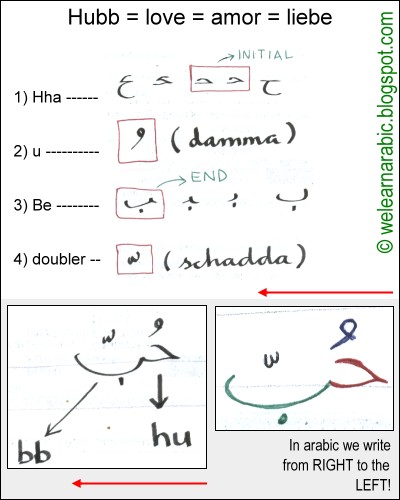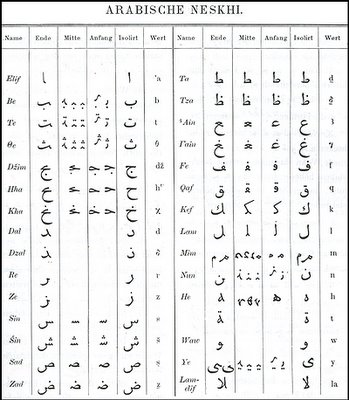1) Writing in Arabic
Take it easy and believe me, it is not that bad! Somehow the arabic language has the same structure as the western languages, a letter or a sign represents a sound. It is a phonetical system. The difference is that the arabs have their own alfabeth. Exactly like the greeks and russians and many other people.
This is a main difference to put arabic not closer in harshness as the chinese language. The chinese language and system of signs is completely different and a single sign or letter is a word for itself!!! This system was created (maybe) to help everyone there to understand a single system of writing that could be spoken by many tribes with many dialects, they can have a different "word" for this "sign/letter" but the MEANING of the sign is the same for them all!!!! So all of them, from north to south and from west to east China's could understand a writen text in chinese. At least the higher development of what we could understand as a chinese standart writing system -- I am not actualized about this matter so please do your own research about chinese language.
In arabic does not happens the same and not happens also with many europeans systems of writing language. Our system is phonetical and not pictorial. A sign or letter represents merely a sound and have (sometimes - abreviations not mentioned!!) no meaning alone without a context. And that's why the majority of arab dialects (or dialects from original tribes in Lands were arabs took control and influenced the culture) are not writen, only spoken and all children in schools must learn tradicional arabic to understand journals, books, internet, literature in general and, at last but not at least, the Sacred Quran!
The origins of the Arabic Language are mixed profoundly with the Sacred book of Islam. Some islamic scholars afirm that Quran should not be translated and it should be read in arabic. Therefore in their opinion if you want to understand the pure meanings of this book you should start learning arabic -- I myself can only say that I dislike very much to see movies not in their original language, ok, but it is even worse to see that the so called "subtitles" in other languages are often translated completely different from the original language... I perceive it often when seeing translations of brasilian movies into german or english, it is a tough job! I wonder how much we loose when an arabic movie is translated then into other languages.
But, of course, there are also differencials when we talk about "arabic alfabeth" because the arabic language can be, when not spoken, at least understood from Morocco till Indonesia! And in between all these nations did also contribute for the enrichment of the alfabeth. There are "sounds" that a persian can speak or maybe understand, like the letter "P", that an arab (maybe) cannot and translates as "B". And so on. Exists not only severals styles to write in arabic but also several "alfabeths" that enriched (I would say) the original arabic alfabeth: persian, afegan, turk, hindi, malayisian, etc. But I will only discuss and show examples based on the Neschi alfabeth!!!!
Bellow you will see the example to write the word "Hubb" that means Love. Take your time and a peace of paper and a pen and try it yourself!!!!

Observe please that the examples of the letter "Hha" and "Be" are from right to left and means:
- end, midle, begin, deteached ( I always will give the examples from right to left and in this order)
- some vowels are supposed to be represented sometimes by small signs bellow or above a letter. The vowel "damma" for "u" stays above the letter "Hha" to compose "Hu".
- some especial symbols like the "schadda" aren't to be spoken but understood as a doubler consonant like in "bb".













